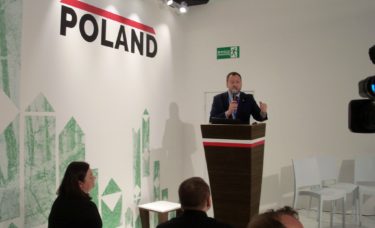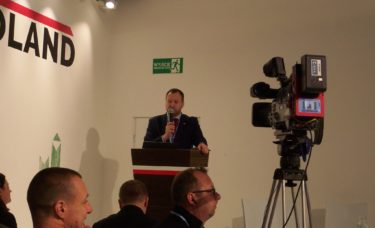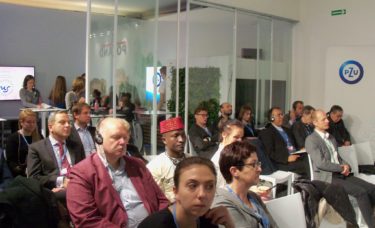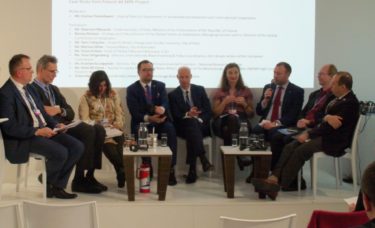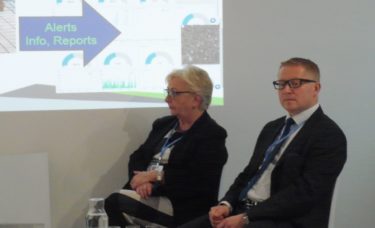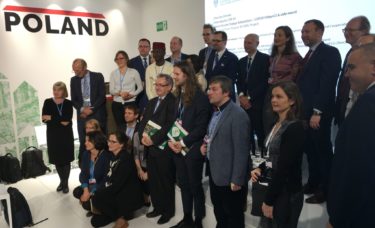
COP 24 – Urban Day
The role of cities in the adaptation to climate change, transformation of post-industrial areas in accordance with the idea of "black to green", decarbonisation of urban and road transport and challenges related to climate change in the region and city were the most important issues addressed during the Urban Day, organised by the Ministry of Investment and Economic Development on 8 December 2019 in the Polish National Pavilion.
The meeting was opened by the Deputy Minister Małgorzata Jarosińska-Jedynak and Mariusz Skiba, the Deputy Mayor of Katowice.
I believe that an effective urban policy is an important element of concern for sustainable development, because although the care for the climate has a global dimension, to achieve this dimension we must act locally - underlined M. Jarosińska-Jedynak.
Among the challenges that Polish cities are facing nowadays is the fight against smog. One of the activities thanks to which cities will become more sustainable, the quality of life will improve and the environment will become more friendly is electromobility.
Development for low-emission transport is an important part of the Infrastructure and Environment Programme, in which over 9 billion PLN has been allocated to support public transport. As part of the implemented projects 200 km of tram lines will be built or modernised, over 350 items of modern tram rolling stock and 506 buses will be purchased, of which 293 are low or zero emission buses - said M. Jarosińska-Jedynak.
Mariusz Skiba, the Deputy Mayor of Katowice, emphasised the important role of cities in the context of climate change: This is an undeniable fact. We must be aware that 75% of the world's population in 2050 will be living in cities.
During the session: Black to green in progress the representatives of the government, local government and business as well as local entrepreneurs discussed such issues as: transformation of cities, working out strategies for their development in the context of sustainable development and improvement of the quality of life. The discussion moderator Jan Bondaruk from the Central Mining Institute pointed out in his speech that the process of transformation of post-industrial areas in accordance with the idea of "black to green" had already started in Silesian cities, which served as an experimental laboratory for those transformations. At the same time, he stipulated that such processes required long-term planning and were also so complicated that they required the cooperation of a number of interested parties. According to Bondarczyk, @ J.Bondaruk ? - poprawić w wersji polskiej our weak point is the lack of long-term planning.
Among the participants of the session: Black to green in progress were: Mariusz Skiba, Deputy Mayor of Katowice, Tomasz Gasidło, Department of Culture and Heritage, Municipality of Zabrze, Rev. Dr. Witold Kania, Faculty of Theology at the University of Silesia, Janusz Belok, Department of Building Engineering and Building Physics of the Silesian University of Technology and Mirosław Czarnik from GPP Business Park S.A.
Climate change is one of the most important threats to sustainable development, stability of the economy and secure society - said Sławomir Mazurek, Deputy Minister of the Environment opening the discussion during the session: Urban climate change adaptation.
Adaptation to climate change is a relatively new trend in the development policy of states and cities, which cannot be underestimated - said the Deputy Minister. He pointed out that cities were particularly sensitive areas in which the most urgent challenges were concentrated, from water scarcity and poor air quality to economic disruptions and social instability. He also stressed the importance of building synergies and a platform for the exchange of experience and good practices among the cities. The main participants of the discussion were: Patrick V. Verkooijen, Director of the Global Centre on Adaptation, Yann Françoise, Head of Climate, Energy and Circular Economy Strategies at the City of Paris, Mariusz Skiba, Deputy Mayor of Katowice, Yunus Arikan, Head of Global Policy and Advocacy, International Council for Local Environmental Initiatives - ICLEI, Yvon Slingenberg, Director of International, Mainstreaming and Policy Coordination, DG Climate Action, European Commission, Krystian Szczepański, Director of the Institute of Environmental Protection - National Research Institute.
Dr. Janina Fudała from IETU – an expert in diagnosing the condition and forecasting quality changes of the environment, participated in the session: Challenges related to climate change - in the region and the city.
The session was also attended by: Dr. Tomasz Bochenek, Chair and Clinic of Cardiac Surgery, Medical University of Silesia, Prof. Marcin Pietrzykowski, Faculty of Forestry, University of Agriculture in Cracow and Prof. Gabriela Woźniak, Faculty of Biology and Environmental Protection, University of Silesia. Session was moderated by Jan Bondaruk.
The discussion about the challenges the Silesian Voivodship must respond to, began with the problem of the impact of air quality and climate change on health. Pollutants we breathe in from the air ruin our health and worsen the quality of life - said Dr. Tomasz Bochenek from the Chair and Clinic of Cardiac Surgery at the Medical University of Silesia.
Dr. Janina Fudała from IETU presented the activities undertaken by the Silesian Voivodship in the field of reduction of pollutants covered by the Convention on Long-range Transboundary Air Pollution and the Framework Convention on Climate Change.
Thanks to the initiative of the Ministry of the Environment to transfer the control of emission reduction to a voivodship level by establishing border emissions for voivodships for the years 2010 and 2020 it is possible to monitor Poland’s ability to meet international obligations in the field of air emission reduction. The analysis carried out in 2015, concerning the levels of national emission of air pollutants covered by international limits for 2020, shows that Poland already in 2015 fulfilled its obligations regarding the national reduction of NOx, NH3 and TSP emissions. For SO2, within five years, emission will have to be reduced by 38%, for NMVOC by 19% and for PM2.5 by 13%. Emission limits for the Silesian Voivodship established for 2010 have been achieved with surplus. In contrast, the emission limits set for 2020 for the Silesian Voivodship in 2015 have already been achieved for NOx, NH3, CO and TSP. However, for SO2 and NMVOC, reduction of 23% and 81% is required, respectively - said Dr. Janina Fudała.
During the discussion, Prof. Gabriela Woźniak from the University of Silesia emphasised the role of ecosystems in increasing the absorbed amount of carbon dioxide. Prof. Pietrzykowski from the University of Agriculture in Cracow stressed that there was no modern city without the cooperation of foresters with the local government. Plantings carried out in strategic places in urban areas allow to lower the air temperature, which is important in the case of the hottest months of the year. A large area of forests and city parks ensures an increase in CO2 accumulation, with a simultaneous increase of their ability to absorb carbon dioxide, which may prove extremely beneficial for cities in the current situation.
Since the beginning of the economic transformation in the early 1990s the largest emission reductions in Poland until 2015 were recorded for SO2 (74%) and TSP (67%). NH3 emission was reduced by 39%, PM10 by 36% and PM2.5 by 28%, despite Poland's failure to ratify any of the Protocols of the Geneva Convention on Long-range Transboundary Air Pollution. However, the Kyoto Protocol, which was ratified by Poland and obliged its parties to a 6% reduction in greenhouse gas emission by 2012 compared to the base year 1990 was implemented with a 30% reduction.
FOTOGALERIA
-
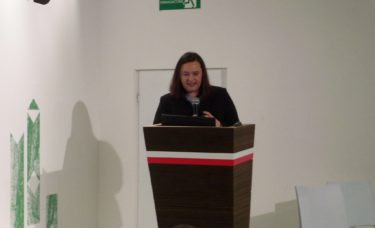
- COP 24, Urban Day, 8 December 2018, Małgorzata Jarosińska-Jedynak, Ministry of Investment and Economic Development (Photo: IETU)
-
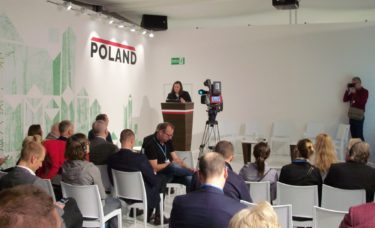
- COP 24, Urban Day, 8 December 2018, Małgorzata Jarosińska-Jedynak, Ministry of Investment and Economic Development (Photo: IETU)
-
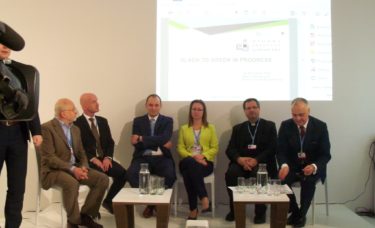
- COP 24, Urban Day, 8 December 2018, Panelists of the session: Black to green in progress (Photo: IETU)
-
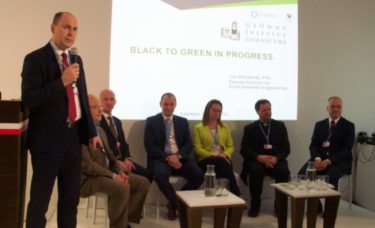
- COP 24, Urban Day, 8 December 2018, Session: Black to green in progress – Jan Bondaruk, Moderator, Central Mining Institute (Photo: IETU)
-
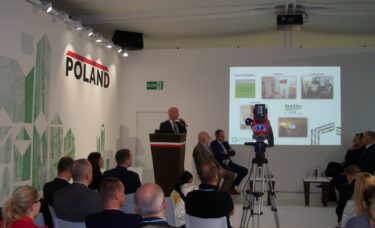
- COP 24, Urban Day, 8 December 2018, Session: Black to green in progress – Daniel Wolny, Department of Environmental Development, Katowice City Hall (Photo: IETU)
-
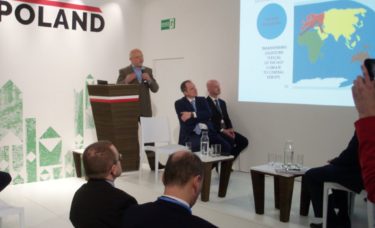
- COP 24, Urban Day, 8 December 2018, Session: Black to green in progress – Janusz Belok, Department of Building Engineering and Building Physics, Silesian University of Technology (Photo: IETU)
-
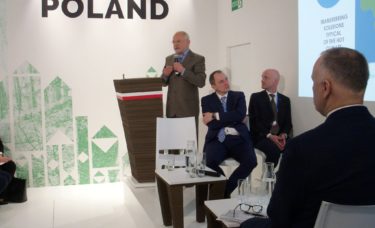
- COP 24, Urban Day, 8 December 2018, Session: Black to green in progress – Janusz Belok, Department of Building Engineering and Building Physics, Silesian University of Technology (Photo: IETU)
-
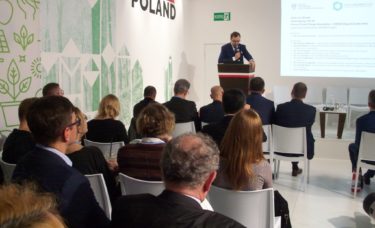
- COP 24, Urban Day, 8 December 2018, Session: Urban climate change adaptation – Sławomir Mazurek, Undersecretary of State, Ministry of the Environment (Photo: IETU)
-
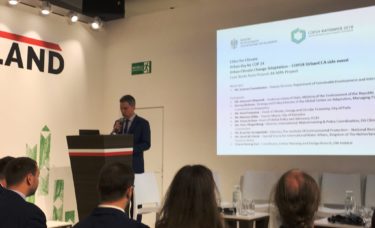
- COP 24, Urban Day, 8 December 2018, Session: Urban climate change adaptation – Szymon Tumielewicz, Deputy Director of the Department of Sustainable Development and International Cooperation, Ministry of the Environment (Photo: IETU)
-
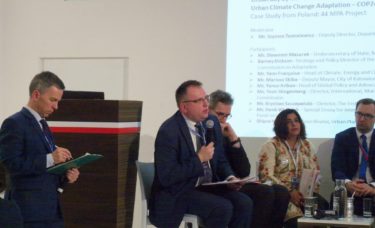
- COP 24, Urban Day, 8 December 2018, Session: Urban climate change adaptation – Krystian Szczepański, Director of the Institute of Environmental Protection – National Research Institute (Photo: IETU)
-
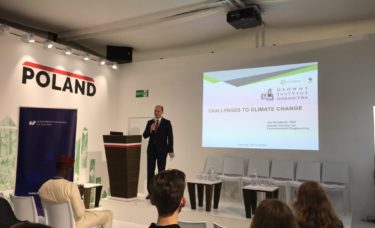
- COP 24, Urban Day, 8 December 2018, Session: Challenges related to climate change – in the region and the city – Jan Bondaruk, Moderator, Central Mining Institute (Photo: IETU)
-
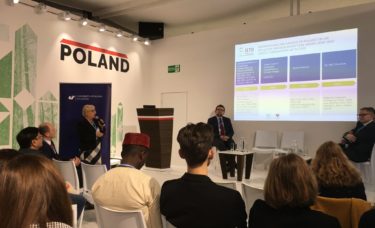
- COP 24, Urban Day, 8 December 2018, Session: Challenges related to climate change – in the region and the city – Dr. Janina Fudała, IETU (Photo: IETU)
-
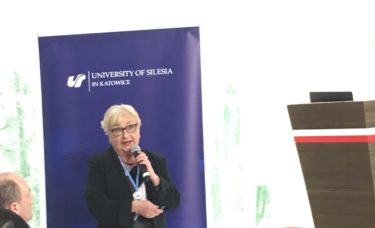
- COP 24, Urban Day, 8 December 2018, Session: Challenges related to climate change – in the region and the city – Dr. Janina Fudała, IETU (Photo: IETU)
-
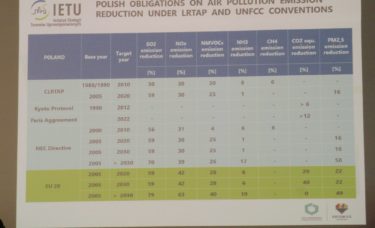
- COP 24, Urban Day, 8 December 2018, Session: Challenges related to climate change – in the region and the city – actions of the Silesian Voivodship aimed at the emission reduction under the Convention on Long-range Transboundary Air Pollution and the Framework Convention on Climate Change
-
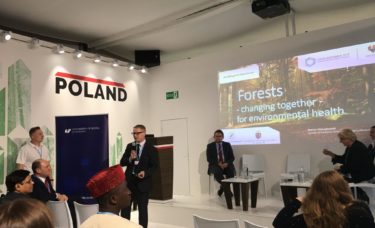
- COP 24, Urban Day, 8 December 2018, Session: Challenges related to climate change – in the region and the city – Prof. Marcin Pietrzykowski, Faculty of Forestry, University of Agriculture in Cracow (Photo: IETU)
-
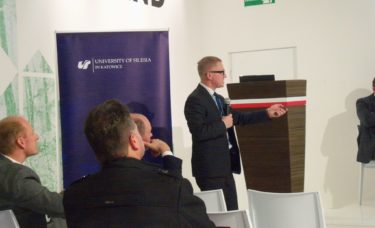
- COP 24, Urban Day, 8 December 2018, Session: Challenges related to climate change – in the region and the city – Prof. Marcin Pietrzykowski, Faculty of Forestry, University of Agriculture in Cracow (Photo: IETU)
-
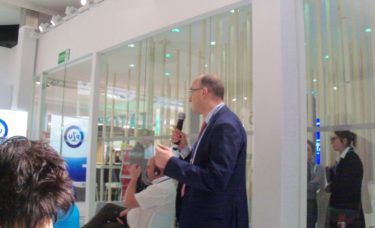
- COP 24, Urban Day, 8 December 2018, Session: Challenges related to climate change – in the region and the city – Piotr Cofałka, IETU (Photo: IETU)









